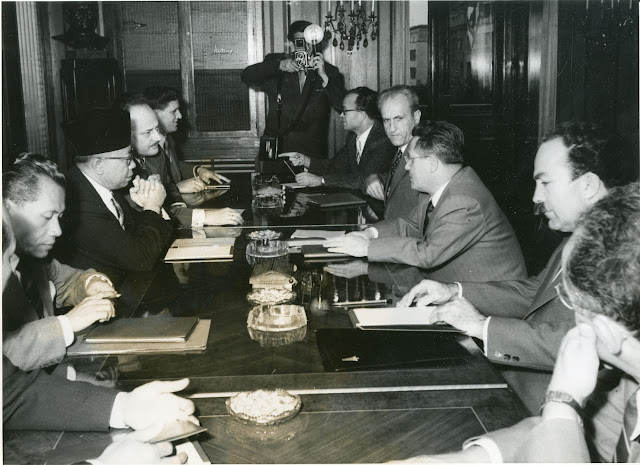 |
| Foto google |
One of Djoeanda Kartawidjaja's greatest contributions during his tenure was the Djuanda Declaration in 1957. This declaration stated that the Indonesian seas, including the seas around, between, and within the Indonesian archipelago, are an integral part of the Indonesian territory. This declaration was later recognized in the United Nations Convention on the Law of the Sea (UNCLOS).
Djoeanda Kartawidjaja's dedication and contributions are honored by commemorating his name in several places in Indonesia. One of them is the Djuanda Airport in Surabaya, East Java. The airport was named in recognition of his efforts in advocating for the construction of the airfield. Additionally, his name is also commemorated in the Ir. H. Djuanda Grand Forest Park in Bandung, which includes the Ir. H. Djuanda Museum and Monument.
On November 7, 1963, Djoeanda Kartawidjaja passed away due to a heart attack. He was buried in the Kalibata Heroes Cemetery in Jakarta. In recognition of his services, based on Presidential Decree No. 244/1963, Ir. H. Djuanda Kartawidjaja was appointed as a national figure and a national independence hero.
 |
| Foto google |
Ir. H. Djuanda Kartawidjaja was born in Tasikmalaya on January 14, 1911. He was the first child of Raden Kartawidjaja and Nyi Monat. His father was a Mantri Guru (teacher) at the Hollandsch Inlansdsch School (HIS). Djoeanda completed his primary education at HIS before transferring to the Europesche Lagere School (ELS), a school for children of Europeans. In 1924, he completed his education at ELS.
Afterward, Djoeanda Kartawidjaja continued his education at the Hogere Burger School (HBS) in Bandung, a special secondary school for Europeans. In 1929, he graduated from HBS. In the same year, Djoeanda entered the Technische Hoogeschool te Bandoeng (THS), now known as the Bandung Institute of Technology (ITB). He pursued civil engineering and graduated in 1933. During his youth, Djoeanda was active in non-political organizations such as Paguyuban Pasundan and became a member of Muhammadiyah. He served as a school leader in Muhammadiyah.
The Struggle of Djoeanda Kartawidjaja :
Djoeanda Kartawidjaja was a dedicated state servant and community servant worthy of emulation. After graduating from ITB, he chose to teach at the Muhammadiyah High School in Jakarta with a limited salary. At that time, he had received an offer to become an assistant lecturer at ITB with a higher salary.
In 1937, after four years of teaching at Muhammadiyah High School in Jakarta, Djoeanda Kartawidjaja joined the government service in the Jawaatan Irigasi Jawa Barat (West Java Irrigation Office). Additionally, he was also active as a member of the Jakarta Regional Council.
After the Proclamation of Independence on August 17, 1945, Djoeanda Kartawidjaja was involved in the struggle for Indonesian independence. He became a member of the Investigating Body for Preparatory Work for Indonesian Independence (BPUPKI) in 1945 and later became a member of the Preparatory Committee for Indonesian Independence (PPKI).
In his career in the government sector, Djoeanda Kartawidjaja served as the Minister of Public Works in the Hatta I Cabinet and Hatta II Cabinet. He also served as the Minister of Public Works and Electricity in the Ali Sastroamidjojo II Cabinet.
On April 9, 1957, Djoeanda Kartawidjaja was inaugurated as the 10th and last Prime Minister of Indonesia. During his tenure, he issued the Djuanda Declaration, which became a milestone in Indonesian foreign policy. This declaration affirmed Indonesia's sovereignty over its seas and contributed to the development of maritime law at the international level.
Legacy and Recognition :
Djoeanda Kartawidjaja's contributions to Indonesia's history and development have been widely recognized. In addition to the various commemorations bearing his name, he was posthumously awarded the status of national figure and national independence hero by Presidential Decree No. 244/1963.
His legacy also extends to the principles he advocated, such as the importance of unity and territorial integrity. The Djuanda Declaration remains a significant aspect of Indonesia's foreign policy and continues to shape the country's maritime interests.
Djoeanda Kartawidjaja's life and struggles serve as an inspiration for future generations of state servants and leaders. His dedication, integrity, and commitment to Indonesia's development leave a lasting legacy and a reminder of the values that contribute to the nation's progress.
Red



0 Komentar